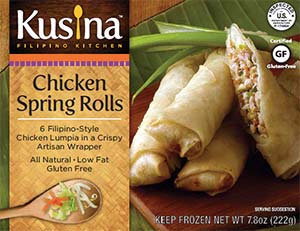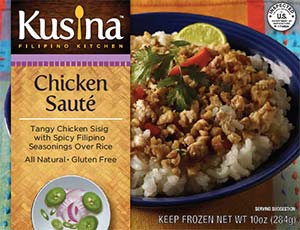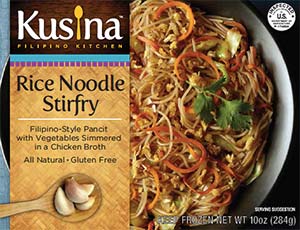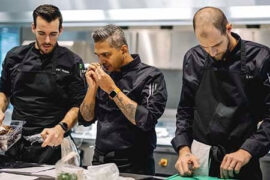California specialty food producers will be front and center January 17-19 at the 41st running of the Winter Fancy Food Show in San Francisco, represented by a contingent of more than 425 companies among 15,000 exhibitors streaming into Moscone Center from across the USA and around the world. Shining among the Golden State group, Ramar Foods International will hold forth at booth #708.
 The company’s origin dates back almost 50-years, when an entrepreneurial husband and wife team emigrated from the Philippines to the San Francisco Bay area in search of the American Dream. In time the family food business blossomed and grew to more than fulfill their American Dream, with one of its major milestones reached with the production and sales of over a billion lumpia (a Filipino-style spring roll featuring a flour and egg-based crispy wrapper loaded with various vegetable, meat or seafood fillings) in North America. Now packing a wide assortment of frozen products ranging from ready meals to premium tropical ice cream under a variety of brand names, Ramar Foods has become the largest provider of Filipino food in North America.
The company’s origin dates back almost 50-years, when an entrepreneurial husband and wife team emigrated from the Philippines to the San Francisco Bay area in search of the American Dream. In time the family food business blossomed and grew to more than fulfill their American Dream, with one of its major milestones reached with the production and sales of over a billion lumpia (a Filipino-style spring roll featuring a flour and egg-based crispy wrapper loaded with various vegetable, meat or seafood fillings) in North America. Now packing a wide assortment of frozen products ranging from ready meals to premium tropical ice cream under a variety of brand names, Ramar Foods has become the largest provider of Filipino food in North America.
This year, the new dream is to make the popular Filipino snack accessible to all consumers with the introduction of gluten-free and GMO-free Chicken Lumpia and Vegetable Spring Rolls in 222-gram six-packs. Distributed in frozen form, it’s the first such product on the retail market that caters to the dietary needs of people afflicted with celiac disease or gluten intolerance. But achieving “firsts” on the Filipino frozen cuisine scene is nothing new for this innovative third-generation family company.
 Ramar Foods was the first to offer prepared Filipino entrees and snacks to a mainstream American audience. Its Kusina brand (which translates to kitchen in Tagalog) features the most popular dishes typically served in a Filipino-American’s home, prepared and ready to heat and eat.
Ramar Foods was the first to offer prepared Filipino entrees and snacks to a mainstream American audience. Its Kusina brand (which translates to kitchen in Tagalog) features the most popular dishes typically served in a Filipino-American’s home, prepared and ready to heat and eat.
Other all-natural, gluten-free Kusina dishes now available are Chicken Sauté and Rice Noodle Stir Fry. The former is made of tangy Chicken Sisig with spicy Filipino seasonings, while the latter is a Filipino-style Pancit with vegetables simmered in a chicken broth. Made in accordance with authentic Filipino family recipes, the line retails at suggested prices ranging from $5.49-$6.49.
A popular non-gluten-free offering on the market is the four-pack of Kusina Chicken Empanadas, described as Spanish-style hand-held meat pies with Filipino flair.
 P.J. Quesada, vice president of company, commented: “Our main audience is not necessarily those of Filipino descent, but rather those who are searching for new flavor experiences made popular by travel and food TV programs, and a surge of new Filipino restaurants. We have been seeing a boost after Madrid Fusion, which was held in Manila last April.” [The annual event is one of the largest culinary extravaganzas in the world where chefs go to see the future.]
P.J. Quesada, vice president of company, commented: “Our main audience is not necessarily those of Filipino descent, but rather those who are searching for new flavor experiences made popular by travel and food TV programs, and a surge of new Filipino restaurants. We have been seeing a boost after Madrid Fusion, which was held in Manila last April.” [The annual event is one of the largest culinary extravaganzas in the world where chefs go to see the future.]
Quesada continued, “Our bestsellers are the spring rolls and tangy chicken (adobo). Lumpia is always popular at gatherings, as well as for individual consumption as a healthy snack.”
What Is Filipino Food?
Cuisine from the Philippines serves up a melting pot of flavor combinations created over 400 years when Spanish settlers in the Western Pacific island archipelago intermingled their recipes and preparation styles with native Filipino, Chinese, Japanese, Indian, Thai, and Malay cooking traditions.
Filipino food was once nicknamed the “shy cuisine” because its representation in mainstream American culture was disproportionate to the size of the Filipino-American community. Filipinos, who began immigrating to the USA in large numbers during the 20th Century, comprise the second-largest Asian ethnic group in the nation after the Chinese. Over the past 50 years, the Filipino-American population has grown to 3.4 million and represents the fourth largest immigrant group in the United States by country of origin – behind Mexico, China and India.
About Ramar Foods Ramar began operations in 1969, when Ramon and Maria (Ra+Mar = Ramar) Quesada started a small business selling Filipino handicrafts at a San Jose street market in California. Soon afterward, that little business, known as Orientex, found a home in Mountain View and began importing various frozen and dry goods, along with traditional handicrafts. Some years later Primo Quesada, the sixth of eleven Quesada children, decided to focus the company’s direction on flavors from Asia and the Philippines. He has successfully guided Ramar Foods into a national distributor of authentic Filipino products made of high-quality ingredients in strict adherence to time-tested family recipes.
Ramar began operations in 1969, when Ramon and Maria (Ra+Mar = Ramar) Quesada started a small business selling Filipino handicrafts at a San Jose street market in California. Soon afterward, that little business, known as Orientex, found a home in Mountain View and began importing various frozen and dry goods, along with traditional handicrafts. Some years later Primo Quesada, the sixth of eleven Quesada children, decided to focus the company’s direction on flavors from Asia and the Philippines. He has successfully guided Ramar Foods into a national distributor of authentic Filipino products made of high-quality ingredients in strict adherence to time-tested family recipes.





